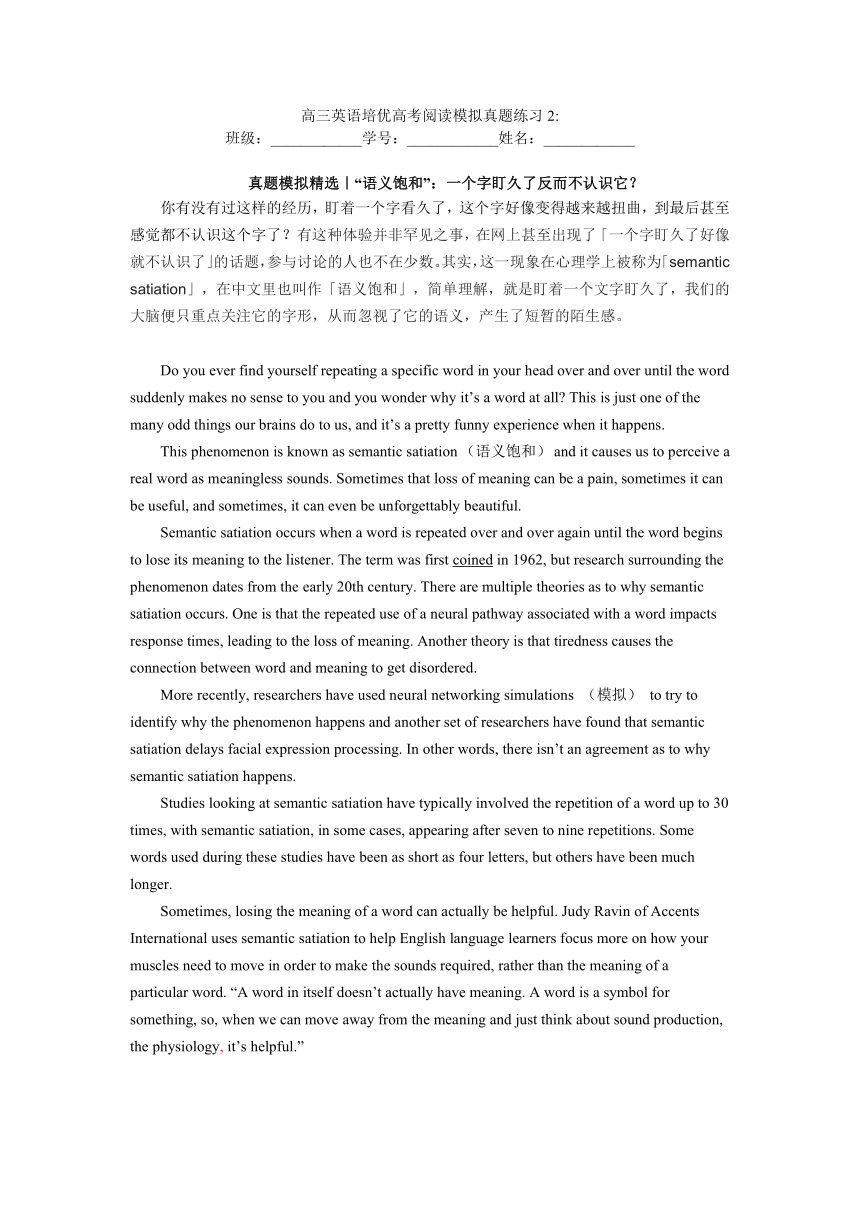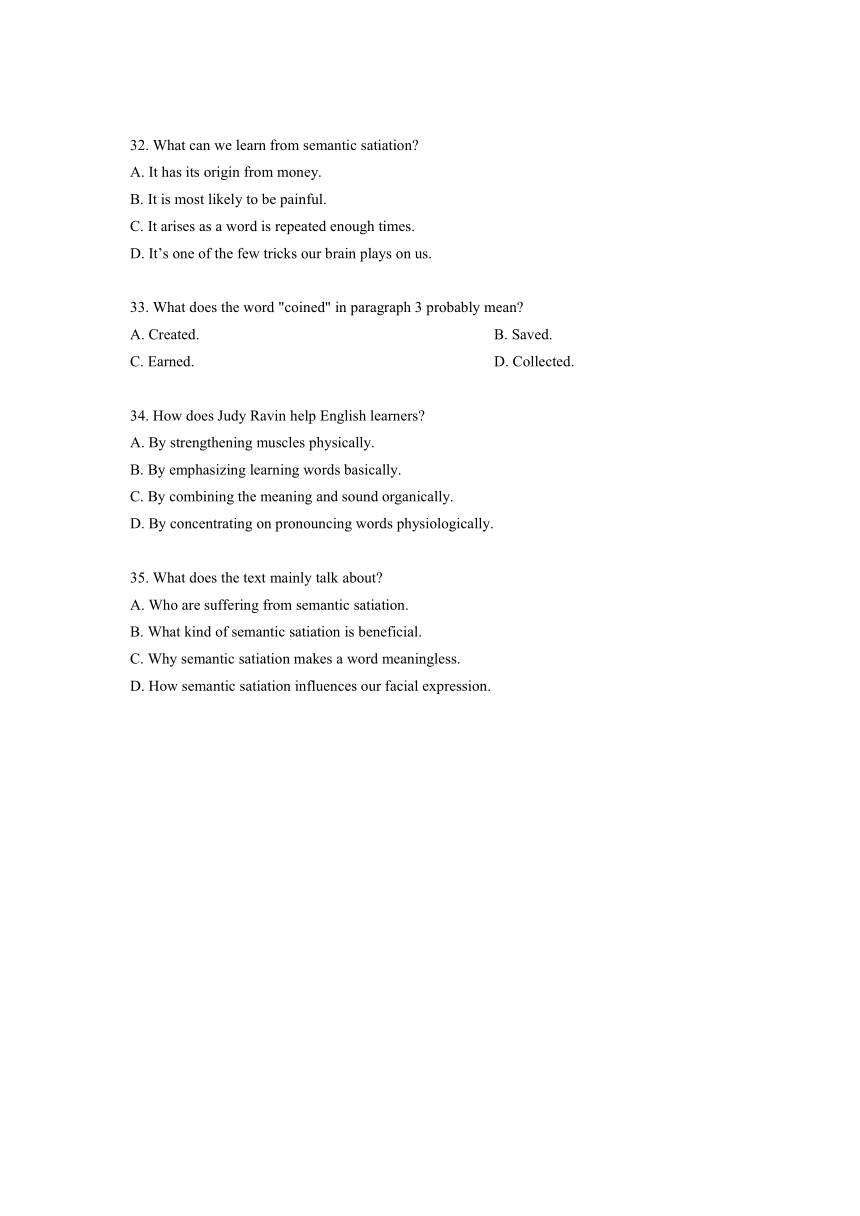2025届高三英语二轮复习培优高考真题阅读(2):“语义饱和”:一个字盯久了反而不认识它?学案
文档属性
| 名称 | 2025届高三英语二轮复习培优高考真题阅读(2):“语义饱和”:一个字盯久了反而不认识它?学案 |

|
|
| 格式 | docx | ||
| 文件大小 | 24.9KB | ||
| 资源类型 | 教案 | ||
| 版本资源 | 人教版(2019) | ||
| 科目 | 英语 | ||
| 更新时间 | 2024-11-17 00:00:00 | ||
图片预览


文档简介
高三英语培优高考阅读模拟真题练习2:
班级:____________学号:____________姓名:____________
真题模拟精选|“语义饱和”:一个字盯久了反而不认识它?
你有没有过这样的经历,盯着一个字看久了,这个字好像变得越来越扭曲,到最后甚至感觉都不认识这个字了?有这种体验并非罕见之事,在网上甚至出现了「一个字盯久了好像就不认识了」的话题,参与讨论的人也不在少数。其实,这一现象在心理学上被称为「semantic satiation」,在中文里也叫作「语义饱和」,简单理解,就是盯着一个文字盯久了,我们的大脑便只重点关注它的字形,从而忽视了它的语义,产生了短暂的陌生感。
Do you ever find yourself repeating a specific word in your head over and over until the word suddenly makes no sense to you and you wonder why it’s a word at all This is just one of the many odd things our brains do to us, and it’s a pretty funny experience when it happens.
This phenomenon is known as semantic satiation (语义饱和) and it causes us to perceive a real word as meaningless sounds. Sometimes that loss of meaning can be a pain, sometimes it can be useful, and sometimes, it can even be unforgettably beautiful.
Semantic satiation occurs when a word is repeated over and over again until the word begins to lose its meaning to the listener. The term was first coined in 1962, but research surrounding the phenomenon dates from the early 20th century. There are multiple theories as to why semantic satiation occurs. One is that the repeated use of a neural pathway associated with a word impacts response times, leading to the loss of meaning. Another theory is that tiredness causes the connection between word and meaning to get disordered.
More recently, researchers have used neural networking simulations (模拟) to try to identify why the phenomenon happens and another set of researchers have found that semantic satiation delays facial expression processing. In other words, there isn’t an agreement as to why semantic satiation happens.
Studies looking at semantic satiation have typically involved the repetition of a word up to 30 times, with semantic satiation, in some cases, appearing after seven to nine repetitions. Some words used during these studies have been as short as four letters, but others have been much longer.
Sometimes, losing the meaning of a word can actually be helpful. Judy Ravin of Accents International uses semantic satiation to help English language learners focus more on how your muscles need to move in order to make the sounds required, rather than the meaning of a particular word. “A word in itself doesn’t actually have meaning. A word is a symbol for something, so, when we can move away from the meaning and just think about sound production, the physiology, it’s helpful.”
32. What can we learn from semantic satiation
A. It has its origin from money.
B. It is most likely to be painful.
C. It arises as a word is repeated enough times.
D. It’s one of the few tricks our brain plays on us.
33. What does the word "coined" in paragraph 3 probably mean
A. Created. B. Saved.
C. Earned. D. Collected.
34. How does Judy Ravin help English learners
A. By strengthening muscles physically.
B. By emphasizing learning words basically.
C. By combining the meaning and sound organically.
D. By concentrating on pronouncing words physiologically.
35. What does the text mainly talk about
A. Who are suffering from semantic satiation.
B. What kind of semantic satiation is beneficial.
C. Why semantic satiation makes a word meaningless.
D. How semantic satiation influences our facial expression.
【词块学习】
第一段:
specific adj.具体的; 特定的; 明确的 n.特性; 细节; 特效药; 显著的性质
over and over again 转来转去; 〔主美〕反反复复
makes no sense 没有意义
odd adj.古怪的,奇怪的,怪异的 n.奇特的事物,怪人
第二段:
perceive vt.感知; 认为; 察觉到; 【perceive A as B 将A视为B】
meaningless adj.无意义的; 不重要的;
unforgettable adj.令人难忘的; 令人难忘地
第三段:
term n.学期; 术语 vt.把…称为; 把…叫作 【term A as B 将A视为B】
coin n.(统称)硬币; 金属货币 vt.创造(新词语); (用金属)铸(币),造(硬币)
dates from=date back to 追溯到
as to 至于 关于
tiredness n.疲劳
disorder vt.杂乱 混乱
第四段:
simulation n.模拟; 仿真; 假装; 冒充
identify vt.识别; 确认; 认出; 说明身份
delay v/n.推迟 延迟
第五段:
typically adv.典型的地 通常; 一般; 典型地; 具有代表性地;
repetition n.重复
muscle n.肌肉
in order to 为了
particular adj.特别的 尤其的
symbol n.象征
move away from 远离
选项词汇:
arise vi.出现
origin from 起源于 来源于
be likely to 可能……
trick n.把戏 【play tricks on sb 捉弄某人,开某人玩笑】
physiological adj.生理学的
suffer from 遭受
【全文翻译】
【第一段:具体事例引出话题】你有没有发现自己一遍又一遍地在脑海中重复一个特定的单词,直到这个单词突然对你来说毫无意义,你想知道为什么它是一个单词?这只是我们的大脑对我们做的许多奇怪的事情之一,当它发生时,这是一种非常有趣的经历。
【第二段:点明主题语义满足】这种现象被称为语义满足,它使我们将真实的单词感知为无意义的声音。有时,失去意义可能是一种痛苦,有时它可能是有用的,有时,它甚至可能是令人难忘的美丽。联合创始人Ilya Kneppelhout说:“人们喜欢它:他们告诉我们这正是他们一直在等待的;他们不敢相信它还不存在。”。“一个名叫贝琳达的女孩在压力和焦虑中挣扎,她告诉我们,她已经一年半没有感到如此平静了。”
【第三段:具体介绍语义满足】当一个词被一遍又一遍地重复,直到这个词开始对听众失去意义时,就会发生语义满足。这个词最早是在1962年创造的,但围绕这一现象的研究可以追溯到20世纪初。关于为什么会发生语义满足,有多种理论。一是重复使用与单词相关的神经通路会影响反应时间,导致失去意义。另一种理论认为,疲劳会导致单词和意义之间的联系紊乱。
【第四段:原因探求】最近,研究人员使用神经网络模拟来试图确定这种现象发生的原因,另一组研究人员发现,语义满足会延迟面部表情处理。换句话说,对于为什么会发生语义满足,人们并没有达成一致意见。
关于语义满足的研究通常涉及一个单词重复30次,在某些情况下,语义满足出现在重复7到9次之后。在这些研究中使用的一些单词只有四个字母那么短,但其他单词要长得多。
有时,失去一个单词的含义实际上可能会有所帮助。Accents International的Judy Ravin使用语义满足来帮助英语学习者更多地关注肌肉需要如何运动才能发出所需的声音,而不是特定单词的含义。“一个词本身并没有真正的意义。一个词是某物的象征,所以,当我们可以摆脱意义,只考虑声音的产生、生理学时,这是有帮助的。”
拓展练习阅读理解参考答案
C 6.A 7.D 8.C
【词汇打卡背诵】
adj.具体的; 特定的; 明确的 n.特性; 细节; 特效药; 显著的性质
转来转去; 〔主美〕反反复复
没有意义
adj.古怪的,奇怪的,怪异的 n.奇特的事物,怪人
vt.感知; 认为; 察觉到; 【perceive A as B 将A视为B】
adj.无意义的; 不重要的;
adj.令人难忘的; 令人难忘地
n.学期; 术语 vt.把…称为; 把…叫作 【term A as B 将A视为B】
n.(统称)硬币; 金属货币 vt.创造(新词语); (用金属)铸(币),造(硬币)
追溯到
至于 关于
n.疲劳
vt.杂乱 混乱
n.模拟; 仿真; 假装; 冒充
vt.识别; 确认; 认出; 说明身份
v/n.推迟 延迟
adv.典型的地 通常; 一般; 典型地; 具有代表性地;
n.重复
n.肌肉
为了
adj.特别的 尤其的
n.象征
远离
vi.出现
起源于 来源于
可能……
n.把戏 【play tricks on sb 捉弄某人,开某人玩笑】
adj.生理学的
遭受
班级:____________学号:____________姓名:____________
真题模拟精选|“语义饱和”:一个字盯久了反而不认识它?
你有没有过这样的经历,盯着一个字看久了,这个字好像变得越来越扭曲,到最后甚至感觉都不认识这个字了?有这种体验并非罕见之事,在网上甚至出现了「一个字盯久了好像就不认识了」的话题,参与讨论的人也不在少数。其实,这一现象在心理学上被称为「semantic satiation」,在中文里也叫作「语义饱和」,简单理解,就是盯着一个文字盯久了,我们的大脑便只重点关注它的字形,从而忽视了它的语义,产生了短暂的陌生感。
Do you ever find yourself repeating a specific word in your head over and over until the word suddenly makes no sense to you and you wonder why it’s a word at all This is just one of the many odd things our brains do to us, and it’s a pretty funny experience when it happens.
This phenomenon is known as semantic satiation (语义饱和) and it causes us to perceive a real word as meaningless sounds. Sometimes that loss of meaning can be a pain, sometimes it can be useful, and sometimes, it can even be unforgettably beautiful.
Semantic satiation occurs when a word is repeated over and over again until the word begins to lose its meaning to the listener. The term was first coined in 1962, but research surrounding the phenomenon dates from the early 20th century. There are multiple theories as to why semantic satiation occurs. One is that the repeated use of a neural pathway associated with a word impacts response times, leading to the loss of meaning. Another theory is that tiredness causes the connection between word and meaning to get disordered.
More recently, researchers have used neural networking simulations (模拟) to try to identify why the phenomenon happens and another set of researchers have found that semantic satiation delays facial expression processing. In other words, there isn’t an agreement as to why semantic satiation happens.
Studies looking at semantic satiation have typically involved the repetition of a word up to 30 times, with semantic satiation, in some cases, appearing after seven to nine repetitions. Some words used during these studies have been as short as four letters, but others have been much longer.
Sometimes, losing the meaning of a word can actually be helpful. Judy Ravin of Accents International uses semantic satiation to help English language learners focus more on how your muscles need to move in order to make the sounds required, rather than the meaning of a particular word. “A word in itself doesn’t actually have meaning. A word is a symbol for something, so, when we can move away from the meaning and just think about sound production, the physiology, it’s helpful.”
32. What can we learn from semantic satiation
A. It has its origin from money.
B. It is most likely to be painful.
C. It arises as a word is repeated enough times.
D. It’s one of the few tricks our brain plays on us.
33. What does the word "coined" in paragraph 3 probably mean
A. Created. B. Saved.
C. Earned. D. Collected.
34. How does Judy Ravin help English learners
A. By strengthening muscles physically.
B. By emphasizing learning words basically.
C. By combining the meaning and sound organically.
D. By concentrating on pronouncing words physiologically.
35. What does the text mainly talk about
A. Who are suffering from semantic satiation.
B. What kind of semantic satiation is beneficial.
C. Why semantic satiation makes a word meaningless.
D. How semantic satiation influences our facial expression.
【词块学习】
第一段:
specific adj.具体的; 特定的; 明确的 n.特性; 细节; 特效药; 显著的性质
over and over again 转来转去; 〔主美〕反反复复
makes no sense 没有意义
odd adj.古怪的,奇怪的,怪异的 n.奇特的事物,怪人
第二段:
perceive vt.感知; 认为; 察觉到; 【perceive A as B 将A视为B】
meaningless adj.无意义的; 不重要的;
unforgettable adj.令人难忘的; 令人难忘地
第三段:
term n.学期; 术语 vt.把…称为; 把…叫作 【term A as B 将A视为B】
coin n.(统称)硬币; 金属货币 vt.创造(新词语); (用金属)铸(币),造(硬币)
dates from=date back to 追溯到
as to 至于 关于
tiredness n.疲劳
disorder vt.杂乱 混乱
第四段:
simulation n.模拟; 仿真; 假装; 冒充
identify vt.识别; 确认; 认出; 说明身份
delay v/n.推迟 延迟
第五段:
typically adv.典型的地 通常; 一般; 典型地; 具有代表性地;
repetition n.重复
muscle n.肌肉
in order to 为了
particular adj.特别的 尤其的
symbol n.象征
move away from 远离
选项词汇:
arise vi.出现
origin from 起源于 来源于
be likely to 可能……
trick n.把戏 【play tricks on sb 捉弄某人,开某人玩笑】
physiological adj.生理学的
suffer from 遭受
【全文翻译】
【第一段:具体事例引出话题】你有没有发现自己一遍又一遍地在脑海中重复一个特定的单词,直到这个单词突然对你来说毫无意义,你想知道为什么它是一个单词?这只是我们的大脑对我们做的许多奇怪的事情之一,当它发生时,这是一种非常有趣的经历。
【第二段:点明主题语义满足】这种现象被称为语义满足,它使我们将真实的单词感知为无意义的声音。有时,失去意义可能是一种痛苦,有时它可能是有用的,有时,它甚至可能是令人难忘的美丽。联合创始人Ilya Kneppelhout说:“人们喜欢它:他们告诉我们这正是他们一直在等待的;他们不敢相信它还不存在。”。“一个名叫贝琳达的女孩在压力和焦虑中挣扎,她告诉我们,她已经一年半没有感到如此平静了。”
【第三段:具体介绍语义满足】当一个词被一遍又一遍地重复,直到这个词开始对听众失去意义时,就会发生语义满足。这个词最早是在1962年创造的,但围绕这一现象的研究可以追溯到20世纪初。关于为什么会发生语义满足,有多种理论。一是重复使用与单词相关的神经通路会影响反应时间,导致失去意义。另一种理论认为,疲劳会导致单词和意义之间的联系紊乱。
【第四段:原因探求】最近,研究人员使用神经网络模拟来试图确定这种现象发生的原因,另一组研究人员发现,语义满足会延迟面部表情处理。换句话说,对于为什么会发生语义满足,人们并没有达成一致意见。
关于语义满足的研究通常涉及一个单词重复30次,在某些情况下,语义满足出现在重复7到9次之后。在这些研究中使用的一些单词只有四个字母那么短,但其他单词要长得多。
有时,失去一个单词的含义实际上可能会有所帮助。Accents International的Judy Ravin使用语义满足来帮助英语学习者更多地关注肌肉需要如何运动才能发出所需的声音,而不是特定单词的含义。“一个词本身并没有真正的意义。一个词是某物的象征,所以,当我们可以摆脱意义,只考虑声音的产生、生理学时,这是有帮助的。”
拓展练习阅读理解参考答案
C 6.A 7.D 8.C
【词汇打卡背诵】
adj.具体的; 特定的; 明确的 n.特性; 细节; 特效药; 显著的性质
转来转去; 〔主美〕反反复复
没有意义
adj.古怪的,奇怪的,怪异的 n.奇特的事物,怪人
vt.感知; 认为; 察觉到; 【perceive A as B 将A视为B】
adj.无意义的; 不重要的;
adj.令人难忘的; 令人难忘地
n.学期; 术语 vt.把…称为; 把…叫作 【term A as B 将A视为B】
n.(统称)硬币; 金属货币 vt.创造(新词语); (用金属)铸(币),造(硬币)
追溯到
至于 关于
n.疲劳
vt.杂乱 混乱
n.模拟; 仿真; 假装; 冒充
vt.识别; 确认; 认出; 说明身份
v/n.推迟 延迟
adv.典型的地 通常; 一般; 典型地; 具有代表性地;
n.重复
n.肌肉
为了
adj.特别的 尤其的
n.象征
远离
vi.出现
起源于 来源于
可能……
n.把戏 【play tricks on sb 捉弄某人,开某人玩笑】
adj.生理学的
遭受
